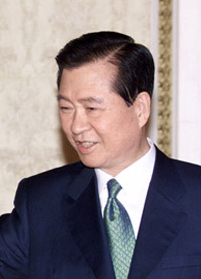2000 inter-Korean summit
2000 inter-Korean summit was a meeting between South Korean president Kim Dae-jung and the Democratic People's Republic of Korea's supreme leader Kim Jong-il, which took place in Pyongyang from June 13 to June 15, 2000. It was the first inter-Korean summit since the Korean War 1950-1953.[1]
Regarding the first inter-Korean summit, the Nobel Peace Prize was awarded to Kim Dae-Jung for his work for democracy and human rights in North and South Korea in East Asia in general. Kim Dae Jung's Sunshine Policy for reconciliation with North Korea was recognized.
[2][3]
Overview
The first summit was held June 13–15, 2000, in Pyongyang. Kim Jong-il, the North Korean supreme leader, met with Kim Dae-jung, the South Korean president at the time, who received the Nobel Peace Prize for his efforts as this summit occurred seemingly as a result of his Sunshine Policy, which South Korea maintained until President Lee Myung Bak adopted a more hardline position against North Korea.
Details
- It was the first Inter-Korean summit meeting after Korean war, and as a result of the talks, the June 15 joint declaration was announced on the last day. On December 25, 2000, the Associated Press of the United States Associated Press published the "Top 10 News in 2000", which ranked 5th was the South–North Korea summit. The inter-Korean talks continued, and North Korea negotiated with normalization of relations with Japan and the United States while maintaining a reconciliation atmosphere. Kim Jong Il's early visit to Seoul was foreseen, but it was not realized due to the sudden change of international situation. In accordance with the North–South Joint Declaration arising from the first Inter-Korean summit, the North-South ministerial and military working-level talks were held four times in Pyongyang, Seoul and Jeju Island from July to December 2000. These also involved North–South Red Cross talks (three times) and several working-level contacts for North and South economic cooperation, continuing until March 2007. Kim Dae Jung, the South Korean president at the time, received the Nobel Peace Prize for successfully arranging the summit.
- However, the South Korean Government paid North Korea approximately US$500 million to attend the Summit.[4] This payment was kept secret at the time and only emerged three years later, causing a major political scandal called the Cash-for-summit scandal. It was later discovered that South Korea had secretly paid the North Korean Government $200 million to attend, and because of this issue 6 South Korean businessmen and officials were convicted.[4] In August 2000, after over 50 years of separation, some members of separated families and relatives in the North and South had a reunification meeting with each other in Pyongyang and Seoul. Subsequent Inter-Korean summit talks were held and the June 15 North–South Joint Declaration was adopted.
Peace declaration (eight-point agreement)
- South and North Korea are to implement the June 15 Joint Declaration
- South and North Korea are to work for mutual respect and trust in order to overcome differences in ideology, system.
- South and North Korea are to ease military tensions, hold defense ministerial talks in November in Pyongyang to discuss ways of supporting inter-Korean economic cooperation and easing tension.
- The two sides agree on the need to end the current armistice and establish permanent peace.
- The two sides are to create a special peace zone around Haeju in North Korea and nearby areas.[1]
- South and North Korea are to develop cooperation in the history, language, education, technology, culture, sports, and social sectors.
- South and North Korea are to actively push for humanitarian cooperation and expansion of the reunions of separated families.
- South and North Korea are to strengthen cooperation for national interest in the international stage and the benefits of Korean residents abroad.
See also
Press releases
- Two Koreas to hold summit (CNN, Aug 7, 2007)
- New hope of inter-Korean detente (UPI, Aug 10, 2007)
- Inter-Korean summit (chinaview, Aug 8, 2007)
- Korean summit postponed by floods (CNN, Aug 18, 2007)
Footnotes
- ^ a b Jon Van Dyke (July 29, 2010). "The Maritime boundary between North & South Korea in the Yellow (West) Sea". 38 North. U.S.-Korea Institute, Johns Hopkins University School of Advanced International Studies. Retrieved 28 November 2010.
- ^ "The Nobel Peace Prize 2000". The Nobel Peace Prize. The Nobel Peace Prize. July 29, 2000. Retrieved 11 August 2018.
- ^ "Kim Dae-jung: South Korean president awarded the Nobel Peace Prize for his 'Sunshine Policy' towards the North". independent.co.uk. independent.co.uk. July 29, 2000. Retrieved 12 August 2018.
- ^ a b "South Korea convicts six over summit". BBC. 2003-09-26. Retrieved 2013-04-12.
References
- The Second Inter-Korean summit: Four Arguments Against and Why They Could Be Wrong (quoted by nautilus.org)
- Ban Ki-moon welcomes forthcoming Inter-Korean summit
- Inter-Korean summit welcome
- Looking forward to new aspect of Inter-Korean summit
- the eight-point agreement by the leaders of the two Koreas at the end of their summit (quoted by koreanblog.com)
- 2nd South-North Korean Summit Joint Statement, The Institute for Far Eastern Studies, Kyungnam University



